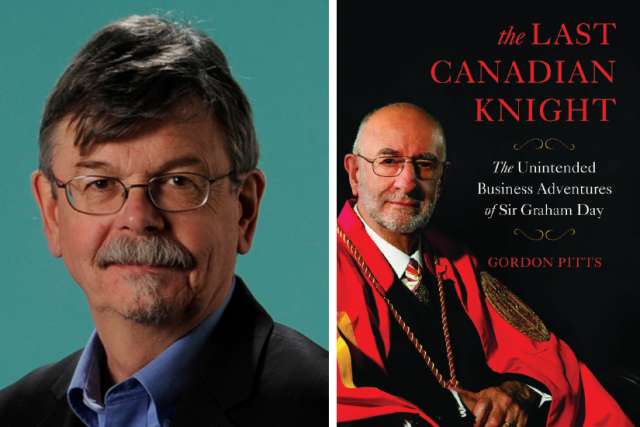Bob Brehl: Life and times of a Canadian knight named Day
By Robert Brehl
It’s always fun to pick up a book and have trouble putting it down because the story grips you.
A new biography called The Last Canadian Knight: The Unintended Business Adventures of Sir Graham Day by Gordon Pitts did just that.
First, Day must be one of the most anonymous ultra-successful Canadians over the second half of the 20th century. Anonymous may not be exactly right because he’s well-known to a select group of Canadians, particularly in the Maritimes. But if you stopped 100 people on the street in other parts of the country, you’d be hard-pressed to find one or two who recognize his name.
Second, for a hard-nosed businessman, Day operated with high moral standards. One of his mottos was “I don’t lie and I don’t bluff.” By all accounts, he was a straight shooter, respected by even those on the opposite side. He talked of preserving as many jobs as possible and it pained him to cut jobs. Indeed, he refused to hire managers who could fire people so easily not to lose any sleep.
To him, a conscience was a key ingredient for business success because it helped open the mind to possible alternatives and lessen stubbornness.
His moral compass also put him ahead of his time: he was blind to gender. He promoted careers based on ability and many woman business leaders today credit him for their success.
Third, his story reads like a movie script. He somehow rose to become one of British Prime Minister Margaret Thatcher’s key advisors throughout the tumultuous 1980s.
His service was rewarded with a knighthood from Queen Elizabeth, possibly the last one to be bestowed upon a Canadian. (You’ll have to read the book to find out why he thinks that.)
While flipping through The Last Canadian Knight, I thought things like “wow, he did that” or “unbelievable that I didn’t know about this Canadian.”
His story starts in Halifax around the time of World War II. He’s a shopkeeper’s son who gets a bit messed up in high school, but still manages to get into university despite tight family finances. (Coincidentally, Thatcher was a grocer’s daughter.)
Day’s academic struggles continue until an adroit professor identifies his potential and gently inspires him. Things click and the young man graduates from law school at age 23, the youngest to do so in the province of Nova Scotia.
“This is a lesson to every teacher who has grappled with an underachieving student: sometimes the situation requires just quiet support until the person matures,” Pitts writes.
Day moves to a small town and begins a career as a country lawyer. In his spare time during the early 1960s, he performs on CBC’s Singalong Jubilee with the likes of a young Anne Murray. After a few years, one of Canada’s largest corporations, Canadian Pacific Ltd., plucks him from his musty Annapolis Valley law practice for a plum job in the country’s then-biggest city. He moves his young family to Montreal.
Almost immediately, he gains a reputation as “Mr. Fix-it” at CP and travels the world from one difficult assignment to another; deals involving railways, shipping, hotels, airlines and oil and gas. Several years pass and he’s offered the top job at an ailing shipbuilding company in Liverpool. He leaves CP and moves his family to England.
Here he makes tough business decisions, but shows kindness, too. In one poignant story, a ship was about to be launched and there was no dignitary to christen it.
Christening ships — the ritual of smashing a bottle of champagne — is a big deal. The christener has to be an important woman, sometimes even the Queen. In this case, Day turned to Nellie Smith, the longest-serving woman worker in the shipyard.
After righting that business, Day returned to Canada for a few years before being summoned back to London to help Thatcher in her plan to privatize several government-owned, floundering businesses. The reader sees Day’s importance grow in the eyes of the prime minister. She invites him to 10 Downing St., pours him a sherry and herself a whisky, then sits back, kicks off her shoes and seeks advice from the Canadian.
After a difficult, but incredibly successful, decade the newly knighted Sir Graham returned to Canada where he served on many high-profile boards such as the Bank of Nova Scotia, Moosehead Breweries, Sobeys and others, including the ill-fated Hydro One privatization in Ontario. He was also appointed chancellor of Dalhousie University in Halifax.
Now 84 and retired, Day is an intriguing figure who has left his mark on both Britain and Canada, and a story anyone interested in Canadian history will enjoy.
(Brehl is a writer and author of several books.)
Tagged under:
Please support The Catholic Register
Unlike many media companies, The Catholic Register has never charged readers for access to the news and information on our website. We want to keep our award-winning journalism as widely available as possible. But we need your help.
For more than 125 years, The Register has been a trusted source of faith-based journalism. By making even a small donation you help ensure our future as an important voice in the Catholic Church. If you support the mission of Catholic journalism, please donate today. Thank you.
DONATE

